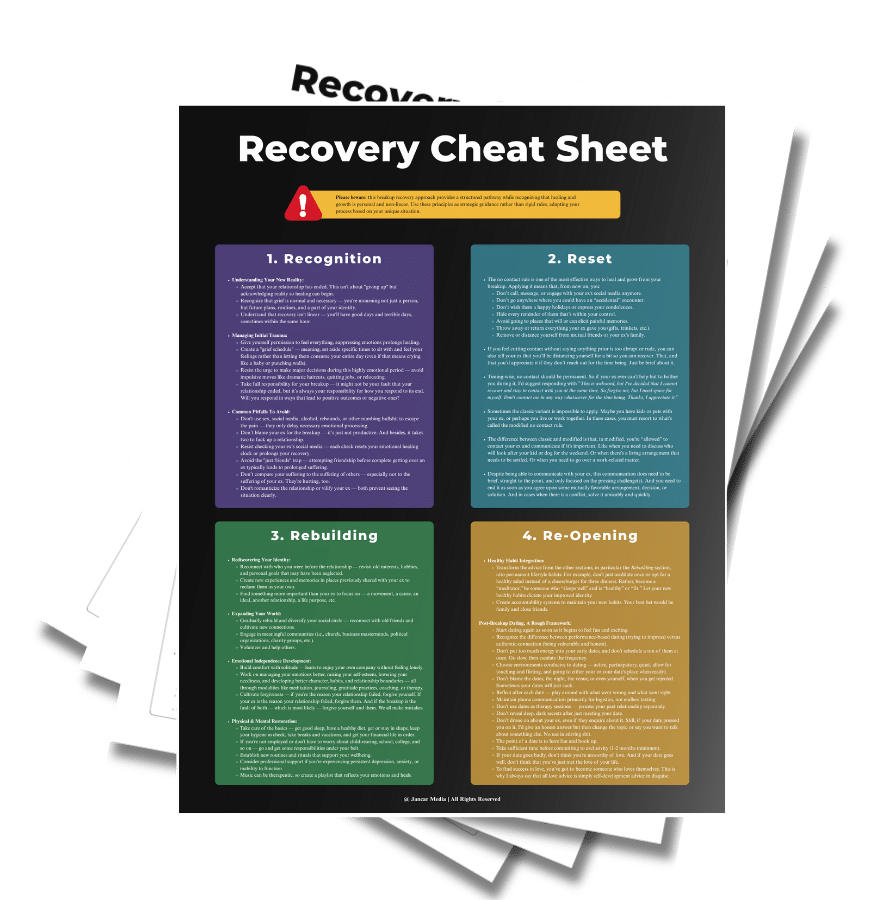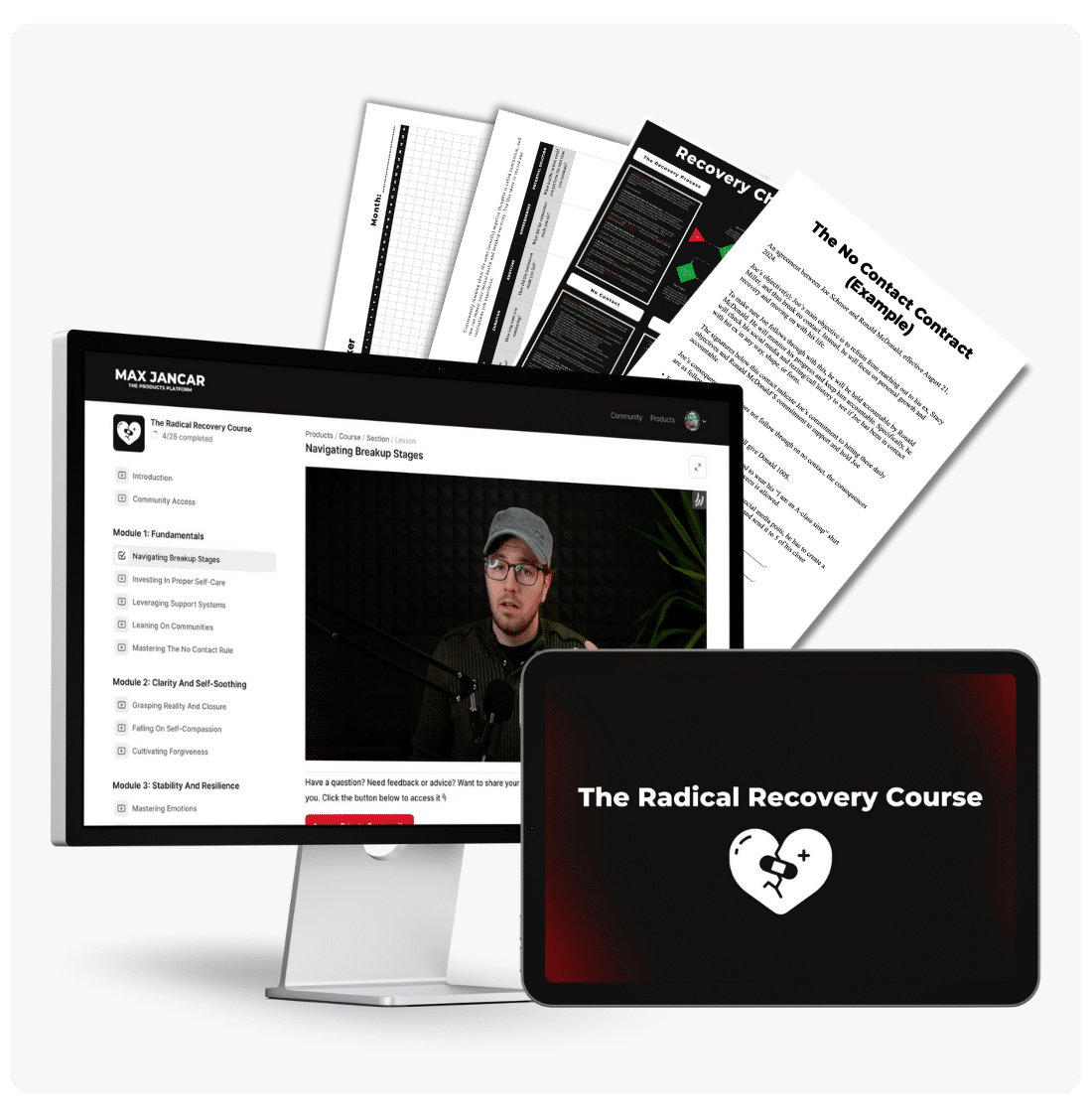Click play to listen to this article.
Maybe you lie awake at night, your mind looping through a relentless highlight reel of your perceived failures. The guilt is crushing you, and the weight of responsibility feels unbearable.
But what if I told you that these types of narratives playing in your head right now are likely distorted? What if the breakup that’s currently tearing you apart isn’t entirely — or even mostly — your fault?
Well, it probably isn’t — at least not as much as you think.
A guide to breakup recovery based on embracing discomfort, extracting wisdom from dark moments, and healing through evidence-based practices.
Order Your CopyWhy You Blame Yourself After A Breakup
To understand why you’re shouldering all this blame, we need to look at what actually happens in most breakups. These patterns reveal why the person who gets dumped almost always blames themselves — even when they shouldn’t. Let’s break down the most common ones I see and figure out where you might fit in.
Scenario 1: Unhealthy Dependence
You started depending on your ex for everything. What began as healthy attachment — wanting to spend time together, have sex, go on dates — turned into unhealthy dependence.
Without realizing it, you made them your entire world. Your ex became your therapist and only social outlet. Your independent life slowly disappeared — no separate hobbies, dwindling friendships, and a schedule that revolves entirely around them.
The result? Your ex felt trapped. They sensed the crushing weight of being responsible for your entire happiness. Instead of feeling like your lover, they felt like your caretaker — and nobody wants to fuck someone they have to parent.
So they leave, and you’re left thinking, this is all your fault. But the truth is, this pattern happens automatically when you don’t maintain your independence. It’s not necessarily a character flaw — it’s a skill you haven’t learned yet.
Scenario 2: Shitty Communication
You essentially noticed problems but stonewalled when difficult topics arose. Instead of addressing issues promptly, you buried them deep.
“Is this really worth an argument?” you asked yourself. “Better to keep the peace than rock the boat.” And each time you chose silence over vulnerability, you stacked another brick in the wall between you and your ex.
This conflict-avoidance feels safer in the moment — no uncomfortable conversations, no potential fights. But those unaddressed issues don’t disappear; they fester underneath, eroding your connection until the relationship collapses under their weight.
The irony? By avoiding small conflicts, you created the ultimate one: a breakup. And now you blame yourself for not speaking up sooner.
Scenario 3: Neglect, Abuse, Cheating
This is the rarest scenario, but nonetheless important. Mainly because it often seems black and white, but is, in reality, far more complex.
I’ve seen cases where the ex who was cheated on had spent years verbally abusing the other ex — constant criticism, emotional manipulation, relentless put-downs. If you spend years poking a bear, should you really be shocked when it finally smashes your face in?
However, it does acknowledge that extreme reactions often follow extreme treatment. When someone feels consistently trapped or neglected, they may make destructive choices to either garner acknowledgment or escape.
In these situations, the fault rarely sits cleanly on one side. The person who cheated bears responsibility for their choices, but the environment that preceded that choice matters too. The hardest part? Recognizing your role in a toxic dynamic like this without taking all the blame onto yourself.
This cheat sheet lays out 40+ solutions to overcoming a breakup so you can create a new opportunity for love — be that with your ex or someone completely different.
Get The Free Cheat SheetDetermining If the Breakup Is Your Fault
Now that you understand these common scenarios, let’s figure out where you actually stand. What I generally tell people when they try to pinpoint fault is to take it step by step. Here’s what I mean…
Step 1: Understand The Situation
For starters, answer me this: why do you think you’ve broken up?
Take out a piece of paper and a pencil, and take 10-20 minutes to write down your answer. When done, consider what your ex said during or right before the breakup. What were their exact words? Write that down too.
Basically, combine your perspective and what you think could be your ex’s perspective.
Step 2: Identify Recurring Issues
Was whatever you’ve identified in step one a consistent problem in your relationship? Is it something your ex brought up time and time again?
Maybe you were constantly late to dates. Maybe you weren’t communicating? Or perhaps you had inappropriate friendships that broke some of your ex’s boundaries — say, friends who clearly kept hitting on you, yet you kept hanging out with them.
Get some ideas like this out in the open. Reflect on them, then write down your findings. Could any of them be a good reason for a breakup? Think hard. And be careful: usually the reason for the breakup will not be one big thing, but a bunch of tiny things — a death by a thousand cuts.
Step 3: Ask Directly
Straight up ask your ex something like, “Hey, is this [your reason(s)] really why we’re breaking up? Or is there something deeper?” And try to phrase it constructively, as in, “I would like to know why we broke up so that I can use that information to grow as a person and do better in my next relationship.”
Important: ideally, this ask should happen during the breakup. However, if you find this article after it, which will be the case for most people, please ignore this last step. You do NOT need to ask your ex this stuff. The only time it would be okay to ask it is if they reach out and you naturally hit off a conversation about the breakup. But, again, I wouldn’t go seeking that conversation.
When It Actually Is Your Fault
I’m talking clear wrongdoing, like cheating without a good motive (i.e., because you’ve been bored, hooked on novelty, or you’re addicted to sex) or extreme violence and abuse.
In these cases, first and foremost, offer a genuine apology. Do it through text, direct message, or a call. Never in person, though — the risk for coming off as too strong or intimidating is too severe.
And beware: the apology should never, EVER be based on the desire to mend the relationship. You should say it because you genuinely mean it, not as a way to get back with your ex.
Got it? Good.
How To Apologize
When ready, say something like, “Hey, are you in a place where you would like to have a talk? I’d like to apologize for what happened in our relationship.”
If your ex is receptive, you can say something like, “Look, I’m not saying this to win you back. I’m saying this because I’m acknowledging that what I did, whatever it may have been, was wrong. I was in the wrong. I’m offering you this apology. I’m going to do better. I just signed up for therapy and am doing XYZ to improve myself.”
That’s it.
No need to drone on and on. Deliver your apology once, cleanly, then move on. Just make sure you include that last part in — the part about bettering yourself. This demonstrates real accountability, showing both your ex and yourself that you’re serious about meaningful change. Without this step, words remain just words.
When They Don’t Accept Your Apology
Occasionally, your ex won’t accept your apology. Respect this. It’s within their rights, after all. Even if they reject it outright or respond with anger, don’t push back or try to convince them they should forgive you. Their healing isn’t on your timeline.
Simply acknowledge their response with something like, “I understand. I just wanted you to know I recognize my role in what happened, and I’m working to change.” Then respect their space. No follow-up texts, no mutual friends deployed as reconnaissance. Just move on.
Besides, the most powerful demonstration of your growth isn’t a perfectly crafted apology — it’s showing you can respect boundaries even when it’s driving you fucking insane.
This cheat sheet lays out 40+ solutions to overcoming a breakup so you can create a new opportunity for love — be that with your ex or someone completely different.
Get The Free Cheat SheetRelated Reading
- 5 Breakup Fallacies That Subtly Screw You Over August 29, 2021
- Attachment Theory Explained (From A Breakup Perspective) April 19, 2023
- Your Ex Is Suffering Too (But Here’s Why That Changes Nothing) May 4, 2025
- Don’t Fear The Rebound Relationship February 17, 2020
- A Practical Guide To Modern Dating After A Breakup March 23, 2023
- The Phantom Ex And The Soulmate June 28, 2022



